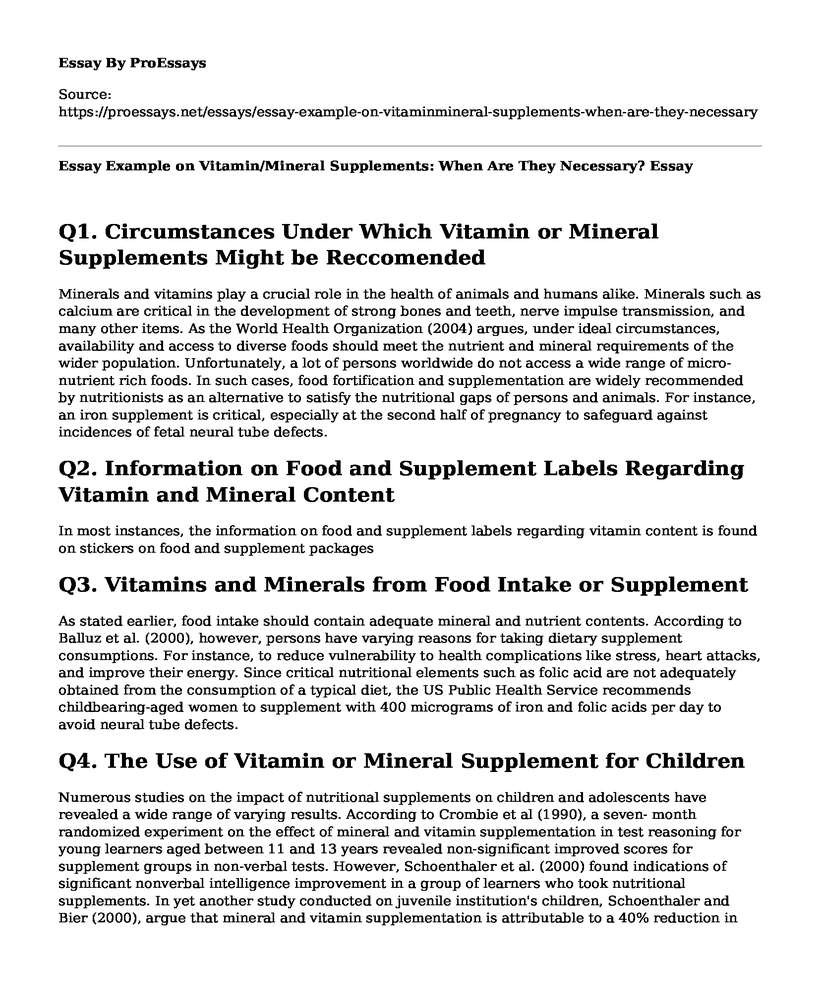Q1. Circumstances Under Which Vitamin or Mineral Supplements Might be Reccomended
Minerals and vitamins play a crucial role in the health of animals and humans alike. Minerals such as calcium are critical in the development of strong bones and teeth, nerve impulse transmission, and many other items. As the World Health Organization (2004) argues, under ideal circumstances, availability and access to diverse foods should meet the nutrient and mineral requirements of the wider population. Unfortunately, a lot of persons worldwide do not access a wide range of micro-nutrient rich foods. In such cases, food fortification and supplementation are widely recommended by nutritionists as an alternative to satisfy the nutritional gaps of persons and animals. For instance, an iron supplement is critical, especially at the second half of pregnancy to safeguard against incidences of fetal neural tube defects.
Q2. Information on Food and Supplement Labels Regarding Vitamin and Mineral Content
In most instances, the information on food and supplement labels regarding vitamin content is found on stickers on food and supplement packages
Q3. Vitamins and Minerals from Food Intake or Supplement
As stated earlier, food intake should contain adequate mineral and nutrient contents. According to Balluz et al. (2000), however, persons have varying reasons for taking dietary supplement consumptions. For instance, to reduce vulnerability to health complications like stress, heart attacks, and improve their energy. Since critical nutritional elements such as folic acid are not adequately obtained from the consumption of a typical diet, the US Public Health Service recommends childbearing-aged women to supplement with 400 micrograms of iron and folic acids per day to avoid neural tube defects.
Q4. The Use of Vitamin or Mineral Supplement for Children
Numerous studies on the impact of nutritional supplements on children and adolescents have revealed a wide range of varying results. According to Crombie et al (1990), a seven- month randomized experiment on the effect of mineral and vitamin supplementation in test reasoning for young learners aged between 11 and 13 years revealed non-significant improved scores for supplement groups in non-verbal tests. However, Schoenthaler et al. (2000) found indications of significant nonverbal intelligence improvement in a group of learners who took nutritional supplements. In yet another study conducted on juvenile institution's children, Schoenthaler and Bier (2000), argue that mineral and vitamin supplementation is attributable to a 40% reduction in violence and antisocial behaviors among juvenile correctional center children. Given these pieces of evidence, I would recommend mineral and vitamin supplementation to parents for young children.
References
Balluz, L. S., Kieszak, S. M., Philen, R. M., & Mulinare, J. (2000). Vitamin and mineral supplement use in the United States: results from the third National Health and Nutrition Examination Survey. Archives of Family Medicine, 9(3), 258. https://triggered.edina.clockss.org/ServeContent?url=http://archfami.ama-assn.org%2Fcgi%2Fcontent%2Ffull%2Farchfami%3B9%2F3%2F258
Crombie, I. K., Todman, J., Kennedy, R. A., McNeill, G., & Menzies, I. (1990). Effect of vitamin and mineral supplementation on verbal and non-verbal reasoning of schoolchildren. The Lancet, 335(8692), 744-747. https://doi.org/10.1016/0140-6736(90)90867-5
Schoenthaler, S. J., & Bier, I. D. (2000). The effect of vitamin-mineral supplementation on juvenile delinquincy among American schoolchildren: A randomized, double-blind placebo-controlled trial. The Journal of alternative and complementary medicine, 6(1), 7-17. https://doi.org/10.1089/acm.2000.6.7
Schoenthaler, S. J., Bier, I. D., Young, K., Nichols, D., & Jansenns, S. (2000). The effect of vitamin-mineral supplementation on the intelligence of American schoolchildren: a randomized, double-blind placebo-controlled trial. The Journal of Alternative and Complementary Medicine, 6(1), 19-29. https://doi.org/10.1089/acm.2000.6.19
World Health Organization. (2004). Vitamin and mineral requirements in human nutrition. World Health Organization.
Cite this page
Essay Example on Vitamin/Mineral Supplements: When Are They Necessary?. (2023, Apr 24). Retrieved from https://proessays.net/essays/essay-example-on-vitaminmineral-supplements-when-are-they-necessary
If you are the original author of this essay and no longer wish to have it published on the ProEssays website, please click below to request its removal:
- Abortion Coverage Debate Paper Example
- Change in Nursing: Lewin's Change Theory Essay
- Personal Statement for Masters of Public Health at King's College London
- Essay Sample on Premature Birth
- Ethics and Death - Essay Sample
- Research Paper on COVID-19: A Global Disaster Impacting Lives Everywhere
- Essay Example on Applying for Nursing Program at Your Institution: A Confident Step Toward Success







